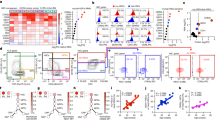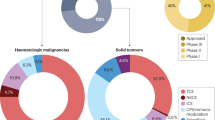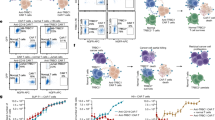Abstract
Collagen type II–induced arthritis is a CD4+ T-cell–dependent chronic inflammation in susceptible DBA/1 mice and represents an animal model of human rheumatoid arthritis. We found that development of this condition, and even established disease, are inhibited by an agonistic anti-4-1BB monoclonal antibody. Anti-4-1BB suppressed serum antibodies to collagen type II and CD4+ T-cell recall responses to collagen type II. Crosslinking of 4-1BB evoked an antigen-specific, active suppression mechanism that differed from the results of blocking the interaction between 4-1BB and its ligand, 4-1BBL. Anti-4-1BB monoclonal antibodies induced massive, antigen-dependent clonal expansion of CD11c+CD8+ T cells and accumulation of indoleamine 2,3-dioxygenase in CD11b+ monocytes and CD11c+ dendritic cells. Both anti-interferon-γ and 1-methyltryptophan, a pharmacological inhibitor of indoleamine 2,3-dioxygenase, reversed the anti-4-1BB effect. We conclude that the suppression of collagen-induced arthritis was caused by an expansion of new CD11c+CD8+ T cells, and that interferon-γ produced by these cells suppresses antigen-specific CD4+ T cells through an indoleamine 2,3-dioxygenase–dependent mechanism.
This is a preview of subscription content, access via your institution
Access options
Subscribe to this journal
Receive 12 print issues and online access
$209.00 per year
only $17.42 per issue
Buy this article
- Purchase on Springer Link
- Instant access to full article PDF
Prices may be subject to local taxes which are calculated during checkout






Similar content being viewed by others
References
Zvaifler, N.J. Pathogenesis of the joint disease of rheumatoid arthritis. Am. J. Med. 75, 3–8 (1983).
Arend, W.P. The pathophysiology and treatment of rheumatoid arthritis. Arthritis Rheum. 40, 595–597 (1997).
Bresnihan, B. et al. Treatment of rheumatoid arthritis with recombinant human interleukin-1 receptor antagonist. Arthritis Rheum. 41, 2196–2204 (1998).
Moreland, L.W. et al. Treatment of rheumatoid arthritis with a recombinant human tumor necrosis factor receptor (p75)-Fc fusion protein. N. Engl. J. Med. 337, 141–147 (1997).
Holmdahl, R., Brockermann, R., Bäcklund, J. & Yamada, H. The molecular pathogenesis of collagen-induced arthritis in mice – a model for rheumatoid arthritis. Ageing Res. Rev. 1, 135–147 (2002).
Williams, R.O., Mason, L.J., Feldmann, M. & Maini, R.N. Synergy between anti-CD4 and anti-TNF in the amelioration of established collagen-induced arthritis. Proc. Natl. Acad. Sci. USA 92, 2762–2766 (1994).
Kwon, B.S. & Weissman, S.M. cDNA sequences of two inducible T-cell genes. Proc. Natl. Acad. Sci. USA 86, 1963–1967 (1989).
Pollok, K.E. et al. Inducible T cell antigen 4-1BB. Analysis of expression and function. J. Immunol. 150, 771–781 (1993).
Melero, I. et al. Monoclonal antibodies against the 4-1BB T-cell activation molecule eradicate established tumors. Nat. Med. 3, 682–685 (1997).
Ye, Z. et al. Gene therapy for cancer using single-chain Fv fragments specific for 4-1BB. Nat. Med. 8, 343–348 (2002).
Halstead, E.S., Mueller, Y.M., Altman, J.D. & Katsikis, P.D. In vivo stimulation of CD137 broadens primary antiviral CD8+ T cell responses. Nat. Immunol. 3, 536–541 (2002).
Bertram, E.M., Lau, P. & Watts, T.H. Temporal segregation of 4-1BB versus CD28-mediated costimulation: 4-1BB ligand influences T cell numbers late in the primary response and regulates the size of the T cell memory response following influenza infection. J. Immunol. 168, 3777–3785 (2002).
Mittler, R.S., Bailey, T.S., Klussman, K., Trailsmith, M.D. & Hoffmann, M.K. Anti-4-1BB monoclonal antibodies abrogate T cell-dependent humoral immune responses in vivo through the induction of helper T cell anergy. J. Exp. Med. 190, 1535–1540 (1999).
Sun, Y. et al. Costimulatory molecule-targeted antibody therapy of a spontaneous autoimmune disease. Nat. Med. 8, 1404–1413 (2003).
Foell, J. et al. CD137 costimulatory T cell receptor engagement reverses acute disease in lupus-prone NZB × NZW F1 mice. J. Clin. Invest. 111, 1505–1518 (2003).
Munn, D.H. et al. Prevention of allogeneic fetal rejection by tryptophan catabolism. Science 281, 1191–1193 (1998).
Grohmann, U. et al. CTLA-4-Ig regulates tryptophan catabolism in vivo. Nat. Immunol. 3, 1097–1101 (2002).
Mellor, A.L. et al. Cutting edge: induced indoleamine 2,3 dioxygenase expression in dendritic cell subsets suppresses T cell clonal expansion. J. Immunol. 171, 1652–1655 (2003).
Fallarino, F. et al. Modulation of tryptophan catabolism by regulatory T cells. Nat. Immunol. 4, 1206–1212 (2003).
Mauri, C., Mars, L.T. & Londei, M. Therapeutic activity of agonistic monoclonal antibodies against CD40 in a chronic autoimmune inflammatory process. Nat. Med. 6, 673–679 (2000).
Mellor, A.L. & Munn, D.H. Tryptophan catabolism and regulation of adaptive immunity. J. Immunol. 170, 5809–5813 (2003).
Terness, P. et al. Inhibition of allogeneic T cell proliferation by indoleamine 2,3-dioxygenase-expressing dendritic cells: mediation of suppression by tryptophan metabolites. J. Exp. Med. 196, 447–457 (2002).
Nakajima, H., Takamori, H., Hiyama, Y. & Tsukada, W. The effect of treatment with interferon-gamma on type II collagen-induced arthritis. Clin. Exp. Immunol. 81, 441–445 (1990).
Futagawa, T. et al. Expression and function of 4-1BB and 4-1BB ligand on murine dendritic cells. Int. Immunol. 14, 275–286 (2002).
Myers, L. et al. CD8 T cells possess suppressor function after 4-1BB and Toll-like receptor triggering. Proc. Natl. Acad. Sci. USA 100, 5348–5353 (2003).
Shuford, W.W. et al. 4-1BB costimulatory signals preferentially induce CD8+ T cell proliferation and lead to amplification in vivo of cytotoxic T cell responses. J. Exp. Med. 186, 47–55 (1997).
Milliken, G.A. & Johnson, D.E. Analysis of Messy Data. Volume I: Designed Experiments (Van Nostrand Reinhold Company, New York, 1984).
Edwards, D. & Berry, J.J. The efficiency of simulation-based multiple comparisons. Biometrics 43, 913–928 (1987).
Acknowledgements
We thank H. Thompson at the LSU Eye Center for statistical analysis. This research was supported by NIH grants R01EY013325 (BSK) and P30EY002377 (departmental Core grant), and the Science Research Center Fund to the Immunomodulation Research Center at the University of Ulsan from KOSEF and the Korean Ministry of Science and Technology.
Author information
Authors and Affiliations
Corresponding author
Ethics declarations
Competing interests
The authors declare no competing financial interests.
Supplementary information
Supplementary Fig. 1
Agonistic anti-4-1BB mAb suppresses development of CIA. (PDF 62 kb)
Supplementary Fig. 2
Histology of ankle joint. (PDF 166 kb)
Supplementary Fig. 3
Production of anti-CII antibodies. (PDF 63 kb)
Supplementary Fig. 4
Phenotypic analysis of CD11c+CD8+CD3+ T cells. (PDF 247 kb)
Supplementary Fig. 5
DNA content of CD11c+CD8+ T cells. (PDF 50 kb)
Rights and permissions
About this article
Cite this article
Seo, S., Choi, J., Kim, Y. et al. 4-1BB-mediated immunotherapy of rheumatoid arthritis. Nat Med 10, 1088–1094 (2004). https://doi.org/10.1038/nm1107
Received:
Accepted:
Published:
Issue Date:
DOI: https://doi.org/10.1038/nm1107
This article is cited by
-
Immune regulation through tryptophan metabolism
Experimental & Molecular Medicine (2023)
-
Mechanisms utilized by feline adipose-derived mesenchymal stem cells to inhibit T lymphocyte proliferation
Stem Cell Research & Therapy (2019)
-
Role of indoleamine 2,3-dioxygenase in testicular immune-privilege
Scientific Reports (2019)
-
Prostaglandin E2 and IL-23 interconnects STAT3 and RoRγ pathways to initiate Th17 CD4+ T-cell development during rheumatoid arthritis
Inflammation Research (2018)
-
CD137‐CRDI is not necessary in the role of contacting its natural ligand
Immunology & Cell Biology (2017)



